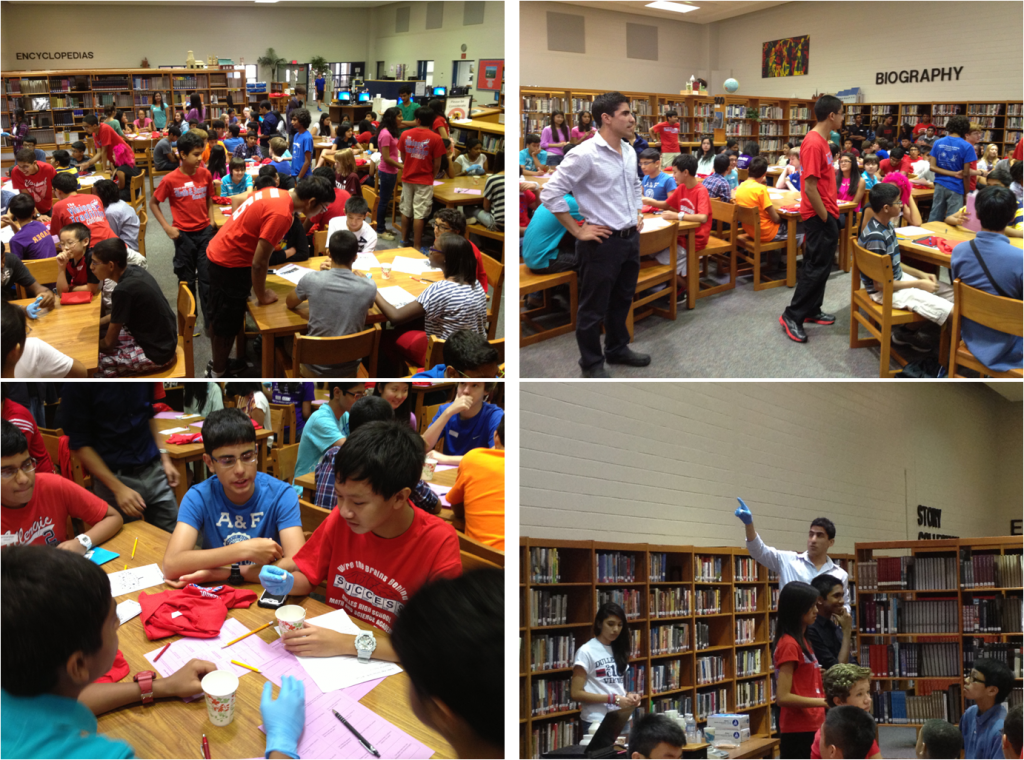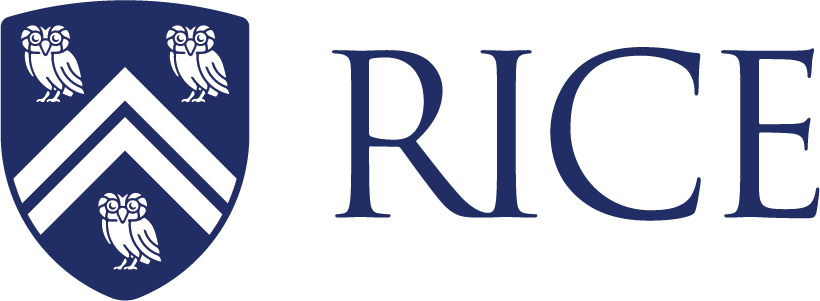The Verduzco Laboratory is actively involved in outreach activities that seek to increase the participation of underrepresented students in science and broaden awareness of science and engineering. Two specific programs are discussed in detail below. In addition to his involvement in these programs, Verduzco also serves as a mentor for ELA-Rice, a faculty committee member for the Rice Center for Engineering Leadership, a Rice first-year student mentor, and as a faculty associate of Sid Richardson College.
Providing opportunities for community college students
Community college students represent a rich pool of potential scientists and engineers. Community colleges educate 50 % of all students in higher education and 20 % of US engineers start their education in community colleges. Less affluent students and minority students, groups that are underrepresented in the scientific workforce, are increasingly served by local two-year community colleges.1 However, the rates for successfully transferring to a four year university and completing a degree are low, and only a small fraction of community college students pursue advanced STEM degrees or careers in STEM. The reasons for this may include a lack of a clear path towards advanced degrees or the lack of proper mentoring. Programs that increase participation of community college students would directly impact the participation of minority and underpriviledged students in science.
The Verduzco group is actively involved in building stronger ties between research universities and local two-year community colleges. Specifically, undergraduate research experiences and mentoring from faculty at research universities can dramatically improve the numbers of community college students who successfully complete a degree in STEM and pursue STEM careers. In the past 20 years, since the National Science Foundation began offering Research Experiences for Undergraduates (REUs), undergraduate research opportunities have dramatically increased, improving the education at research universities and increasing interest in advanced degrees. Several studies have shown that participation in an REU correlates strongly with the likelihood that students will pursue an advanced degree. 1-4 However, even though community college students are often eligible to participate in REUs, they are unaware of these opportunities and generally fail to take advantage of them.

The picture above shows participants in the summer 2010 Undergraduate Summer Research Experience. Four students from the Houston Community College Northwest participated in summer research programs at Rice University and the University of Houston.
Since the summer of 2010, the Verduzco laboratory has mentored four different community college students, two of which worked in the laboratory two consecutive summers. All of these students have successfully transferred or are in the process of transferring to a four-year university to complete a STEM degree. One student is listed as a co-author on two publications currently under review, and two Rice undergraduates have been published as a first or co-author on previous publications from the group.
These summer research activities are managed in large part by graduate student researchers in the group, who train the undergraduate students and oversee their daily work. These experiences have provided individual undergraduate researchers with experience in laboratory work, an increased knowledge of a specific field or discipline, and connections to graduate students and faculty who can serve as mentors and provide advice, assistance, and career input.
In the future, R. Verduzco plans to broaden the scope of these outreach activities by visiting community college classrooms to discuss science and engineering and work with students to introduce current research-focused topics. This program would reach a much larger number of students, approximately 120 community college students per semester. The proposed program would be in collaboration with the Houston Community College-Southeast campus and funded by the National Science Foundation.
Mentoring High School Students in the Dulles Science and Math Academy
 As an alumnus of John Foster Dulles High School in nearby Sugar Land, TX, R. Verduzco has had the unique opportunity to interact with faculty and students at his former school. R. Verduzco recently (March and August 2013) visited Dulles to meet with students in the Math and Science academy at the school. The goal of these visits is to answer students’ questions about careers in engineering, provide students with an appreciation of current research – particularly materials science research – challenges, and to make students aware of opportunities in science and engineering research, both at the high school and undergraduate levels.
As an alumnus of John Foster Dulles High School in nearby Sugar Land, TX, R. Verduzco has had the unique opportunity to interact with faculty and students at his former school. R. Verduzco recently (March and August 2013) visited Dulles to meet with students in the Math and Science academy at the school. The goal of these visits is to answer students’ questions about careers in engineering, provide students with an appreciation of current research – particularly materials science research – challenges, and to make students aware of opportunities in science and engineering research, both at the high school and undergraduate levels.
As part of the science and math academy, senior students are required to complete a senior thesis. R. Verduzco will serve as a judge for the end-of-year poster session and, if needed, will serve as a student mentor. In the future, R. Verduzco plans on implementing classroom visitations similar to those described above for community college classrooms. R. Verduzco will also serve as a faculty mentor for advanced science classes, including chemistry III and physics III which go beyond AP-level content.
Shown above are pictures from R. Verduzco’s most recent visit to the science academy. Working in teams, approximately 100 students worked together to find the optimal composition of gluep, an elastomeric material comprised of poly(vinylacetate) and borate crosslinkers. Each team varied the relative ratio of polymer, crosslinker, and solvent (water) to change the properties of the final crosslinked network.
